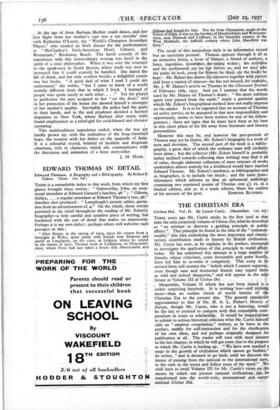THE CHRISTIAN ERA
Civitas Del. Vol. H. By Lionel Curtis. (Macmillan. 12s. 6d.)
THREE years ago Mr. Curtis made, in the first (and at that time the only prOjeeted) volume of Civitas Dei, what he described as " an attempt to discover a _guiding principle in public affairs." This principle he founctin the idea of the " common- wealth," this idea embodying the most important. and charac- teristic contribution made to history by British civilisation. Mr. Curtis has now, as he explains in his preface, attempted to investigate the application of this principle to world affairs today. He has submitted this attempt to a large number cif friends, whose criticisms, some favourable and some hostile, have led him to re-write it' completely. This essay in its revised form will contain the " beliefs which I cannot suppress, even though sane and instructed friends may regard them as wild and indeed dangerous," and will appear in the near . future as Volume III-of Civitas Dei.
• Meanwhile, Volume II which has just been issued is a rather surprising -interlude. It is nothing' less—and nOthirig more—than an outline sketch of world history of the Christian Era to the present day. The general standpoMt approximates to that of Mr. H. A. L. Fisher's History of Europe, though Mr. Curtis, , who is not a historian, would be the last to pretend to compete with that remarkable com- pendium in scope or scholarship. It would be inappropriate to submit to serious historical criticism what Mr. Curtis himself calls an " amateur compilation," written, as he hints in the preface, mainly for self-instruction and for the clarification of his own ideas, and not perhaps originally designed , for publication at all. The reader will turn with most interest to the last chapter, in which he will get some clue to the purpose to which Mr. Curtis is leading up. ". We have now reached a stage in the growth of civilisation which cannot go further," he writes, " and is doomed to go back, until we discover the means of passing from the national to the international state,
to the state in the truest and fullest sense of the word." We shall have to await Volume III for Mr. CurtiS's views on. the means by which our present national civilisations can be transformed into the world-wide, international and - super-
national Civitas Dd. _ _ _ -






























































 Previous page
Previous page